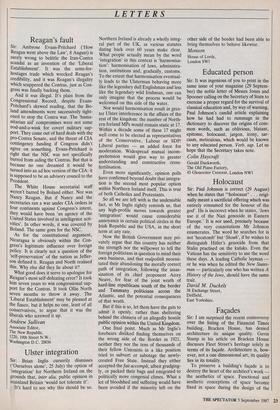Ulster integration
Sir: Brian Inglis cursorily dismisses (`Ourselves alone', 25 July) the option of `integration' for Northern Ireland on the grounds that, inter aka, public opinion in mainland Britain 'would not tolerate it'.
It's hard to see why this should be so. Northern Ireland is already a wholly integ- ral part of the UK, as various statutes dating back over 60 years make clear. What people actually mean by the word `integration' in this context is 'harmonisa- tion': harmonisation of laws, administra- tion, institutions and, gradually, customs. To the extent that harmonisation eventual- ly leads to the Ulsterman behaving more like the legendary dull Englishman and less like the legendary wild Irishman, one can only imagine that the process would be welcomed on this side of the water.
Nor would harmonisation result in grea- ter Ulster interference in the affairs of the rest of the kingdom: the number of North- ern-Ireland MPs would remain static at 17. Within a decade some of these 17 might well come to be elected as representatives of the Conservative, Labour or SDP/ Liberal parties — an added force for moderation. Widespread mutual incom- prehension would give way to greater understanding and constructive cross- fertilisation.
Even more significantly, opinion polls have confirmed beyond doubt that integra- tion is the second most popular option within Northern Ireland itself. This is true of both Catholics and Protestants.
So all we are left with is the undeniable fact, as Mr Inglis rightly reminds us, that any high-profile moves towards greater `integration' would cause considerable annoyance in certain political circles in the Irish Republic and the USA, in the short term at any rate.
Now the British Government may pri- vately argue that this country has neither the strength nor the willpower to tell the foreign politicians in question to mind their own business, and that realpolitik necessi- tated their abandoning the morally correct path of integration, following the assas- sination of its chief proponent Airey Neave, for fear of the joint wrath of hard-line republicans south of the border and Tammany politicians across the Atlantic, and the potential consequences of that wrath.
But if this is so, let them have the guts to admit it openly, rather than sheltering behind the chimera of an allegedly hostile public opinion within the United Kingdom.
One final point. Much as Mr Inglis's forebears disliked finding themselves on the wrong side of the Border in 1921, neither they nor the tens of thousands of their fellow Unionists in a like position tried to subvert or sabotage the newly- created Free State. Instead they either accepted the fait accompli, albeit grudging- ly, or packed their bags and emigrated to politically more congenial climes. What a lot of bloodshed and suffering would have been avoided if the minority left on the other side of the border had been able to bring themselves to behave likewise.
Monson
House of Lords, London SW1


















































 Previous page
Previous page